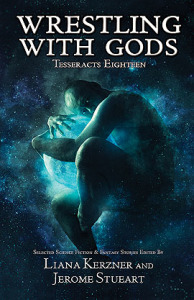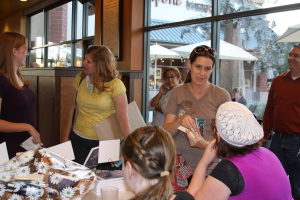The newest volume of the Aurora-Award winning Tesseracts series is available online today!
 Tesseracts 18: Wrestling with Gods examines the intersection between speculative fiction and religion. It’s my honour to be part of this prestigious series with a story entitled Burnt Offerings.
Tesseracts 18: Wrestling with Gods examines the intersection between speculative fiction and religion. It’s my honour to be part of this prestigious series with a story entitled Burnt Offerings.
Corporal Pasharan was destined to spend the rest of his life in a military sanitarium were it not for his tale of a near-death experience with a god. Now sanctified as a Shaman, he’s been equipped with cutting-edge technology and the freedom of cyberspace. He can never dare admit that his tale was a fabrication, or that he remains unconvinced about the existence of any form of deity. When a young soldier converts to another religion and risks the wrath of her theo-political superiors, Shaman Pasharan must find his own kind of faith to make a choice between truth and power.
The title of the anthology was a big inspiration: Wrestling with Gods. I knew I wanted to write about a character whose relationship with his faith wasn’t an easy one. I started thinking: what would it be like for an agnostic character in a ministerial job? What if he didn’t have the luxury of resigning over his doubts, because he counted on that job not just for livelihood but survival? That got me thinking about the intersection between faith and power; between privilege and faith; between speaking the truth and the fact that honesty can sometimes get people killed when the wrong folks are listening.
You can get your own copy of Wrestling with Gods today on Amazon Kindle. Paper copies will be available starting in March (Canada) and April (US).





